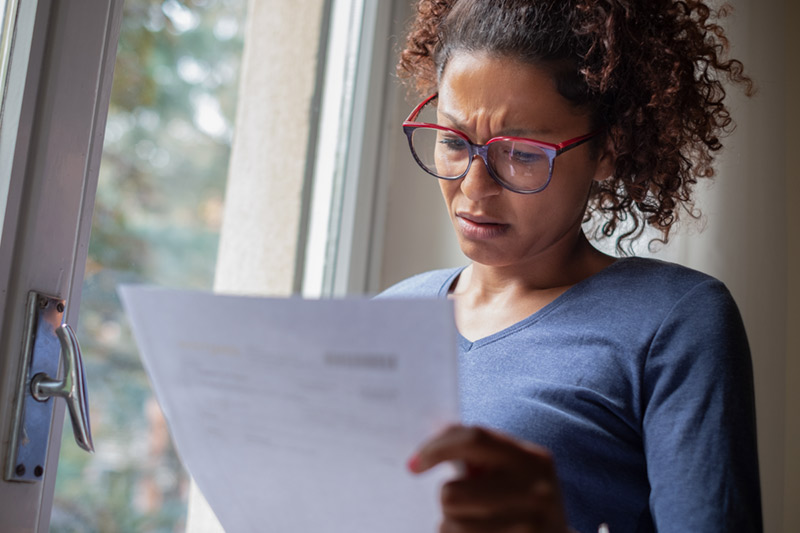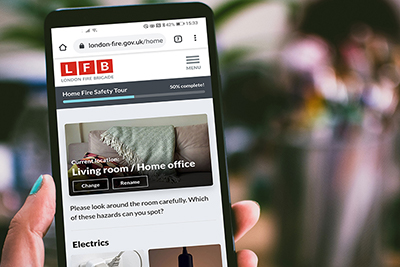Electrical heaters: know the risks
Electrical heaters can be a great way to keep warm – especially if you only want to warm up one room. However, they should be used with care.
- Our figures show on average there are over 160 fires a year.
- Tragically, a third of electrical fires that resulted in a fatality involved heaters.
- More fires seem to occur when it's colder.
Are electrical heaters dangerous?
Most of these fires are easily preventable. Don't become another statistic, it’s important to stay safe while heating your home – read on for advice on how to stay safe when using heaters and fires.
What about open fires, gas fires and other heaters?
Electrical heaters aren't the only way to stay warm. There are many other kinds of heater so scroll down for for safety advice.

Struggling to pay your energy bill?
There is help available if energy costs are getting beyond your budget – Citizens Advice provides lots of info about grants and benefits to help you pay your energy bills or you can contact your energy company for advice.
Why are heaters such a concern?
There are many reasons fires start, but fires involving heaters seem to have a particularly high fatality rate. This might be because of the circumstances they start in:
- Fires typically start when bedding, blankets or clothes are placed too close to heaters.
- People with mobility issues are especially at risk of tripping or falling onto a heater – placing them at a safe distance is all the more important.
- Some kinds of heater also present a carbon monoxide risk which can be fatal. It can make you drowsy and less able to escape. That's why it's so important to always fit a carbon monoxide alarm in rooms with solid fuel, gas or paraffin heaters.
Safer ways to use heaters
Firefighters tips for using heaters safely
All heaters
- Make sure heaters are well maintained and in good working order.
- Check that your heater isn't on a recall list– there have been many fires in the past year connected to heaters that have been recalled.
- Never install, repair or service appliances yourself. Make sure anyone who does is registered with the Gas Safe Register (for gas appliances), the Heating Equipment Testing and Approval Scheme (HETAS) (for solid fuel appliances), or the Oil Firing Technical Association (OFTEC) (for oil appliances).
- Don't take risks with old heaters – if it's electrical and getting older, get it tested by a qualified electrician or buy a new one.
- Where appropriate, secure heaters against a wall to stop them falling over, or fit wall-mounted heaters.
- Keep heaters well away from clothes, curtains and furniture and never use them for drying clothes.
- Always sit at least one metre away from a heater as it could set light to your clothes or chair.
- Before attempting to move your heater, turn it off and allow it to cool first.
Gas fires and biofuel heaters
- Gas heater cylinders should be changed in the in the open air, if you have to change them indoors make sure all rooms are ventilated, open the windows and doors.
- Store spare propane or oxygen cylinders upright and outside whenever possible. Never store them in basements, under stairs or in cupboards containing electric meters or equipment.
- Ensure empty cylinders are collected regularly.
- Fireboxes and containers should always be placed on a stable surface. When using biofuel always follow the manufacturer’s guidelines and instructions.
- Don’t overstock fuels of any type including paraffin or biofuel and store them safely.
- Never add fuel to a burning fire, or refill a firebox fuel container that is still hot.

Check your home's safe using our simple tool
It only takes a few minutes to check your home and get tailored advice for your family.
What about 'real' fires?
Safety tips for log burners and open fires
It's really important to follow some simple rules to keep snug safely with a traditional fire:
- Keep chimneys and flues clean and well maintained.
- Always have your chimney swept by a specialist – at least once a year for coal, twice if burning logs.
- Make sure you use a fireguard to protect against flying sparks and hot embers.
- Before you go to bed, make sure fires or hot embers are under control and guarded.
- Store logs away from solid fuel burners – radiated heat can cause them to burn.
- Keep clothing and fabric well away from open fires and log burners.
- Watch out for children and pets – supervise them carefully, and use fire guards.
Did you know?
Chimney Sweeps should be certified by the National Association of Chimney Sweeps or HETAS.
Carbon monoxide risks – gas fires, open fires and log burners
It's really important to fit a carbon monoxide alarm in all rooms containing solid fuel gas, or paraffin heaters. It's also a good idea to familiarise yourself with the signs of carbon monoxide poisoning, and learn what to do if you suspect there may be a leak.
